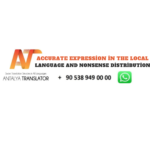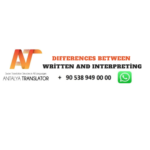
Accurate Expression in the Local Language and Nonsense Distribution in Translation Projects: A Sworn Translation Perspective
August 15, 2023
Differences and Requirements between Written and Interpreting in Translation Projects: Antalya Translator Perspective
August 15, 2023Quality Assurance Approaches and Certifications in Translation Companies: The Search for Professionalism and Reliability
Today, the increasing need for global interaction and communication across the globe has increased the demand for translation services. However, when communicating between different languages and cultures, it is vital to ensure accurate and reliable translations. This is where the quality assurance approaches and certifications of translation companies come into play. Sworn translation, professionalism and the rich cultural fabric of Antalya province play a critical role in setting and ensuring quality standards in translation services.
Quality Assurance Approaches:
Translation companies ensure the successful completion of translation projects by adopting various quality assurance approaches. These approaches aim to ensure consistency, accuracy and customer satisfaction at every stage of the translation process.
- Professional and Sworn Translators: The basis of quality translations is expert and sworn translators. These professionals have both language skills and subject matter knowledge and perform translations in the most accurate manner.
- Language and Expression Controls: In translation projects, language structure, grammar and terminology checks are carried out meticulously. This step is carried out to ensure that translations are clear and consistent.
- Editorial Reviews: Translations are meticulously reviewed by experienced editors. Editors make corrections to preserve the meaning of the texts while improving their language use.
- Technology Assisted Quality Controls: The use of technology in translation services is indispensable to enhance quality assurance. Ensuring consistency in language pairs, terminology management and automatic language control tools play an important role in improving the quality of translations.
Certifications and Approvals:
Various certifications and approvals are obtained to document the reliability and quality of translation companies. These documents give confidence to both customers and stakeholders in the industry.
- ISO 17100 Translation Services Standard: ISO 17100 is an international standard for translation services. This certificate shows that translation companies meet the standards set in the areas of professionalism, language proficiency and process management.
- Local and International Association Approvals: Approval of translation companies by local and international translation associations is a sign that confirms professionalism and quality.
- Customer References and Feedback: Client testimonials and feedback are an effective way to demonstrate the quality of translation companies. Positive references and customer satisfaction are important for ensuring reliability.
The cultural richness of Antalya province requires localisation and cultural sensitivity to be emphasised in translation projects. Translation companies operating in Antalya aim to provide the best service to their clients by accurately translating terminology and expressions specific to the region.
As a result, quality assurance approaches and certifications play a critical role in translation companies to ensure professionalism, reliability and customer satisfaction. While sworn translation plays an important role in setting and implementing quality standards, the cultural richness of Antalya province also emphasises localisation and precision in translation services. By adopting these approaches, translation companies demonstrate their commitment to providing the best service to both their clients and the industry.

